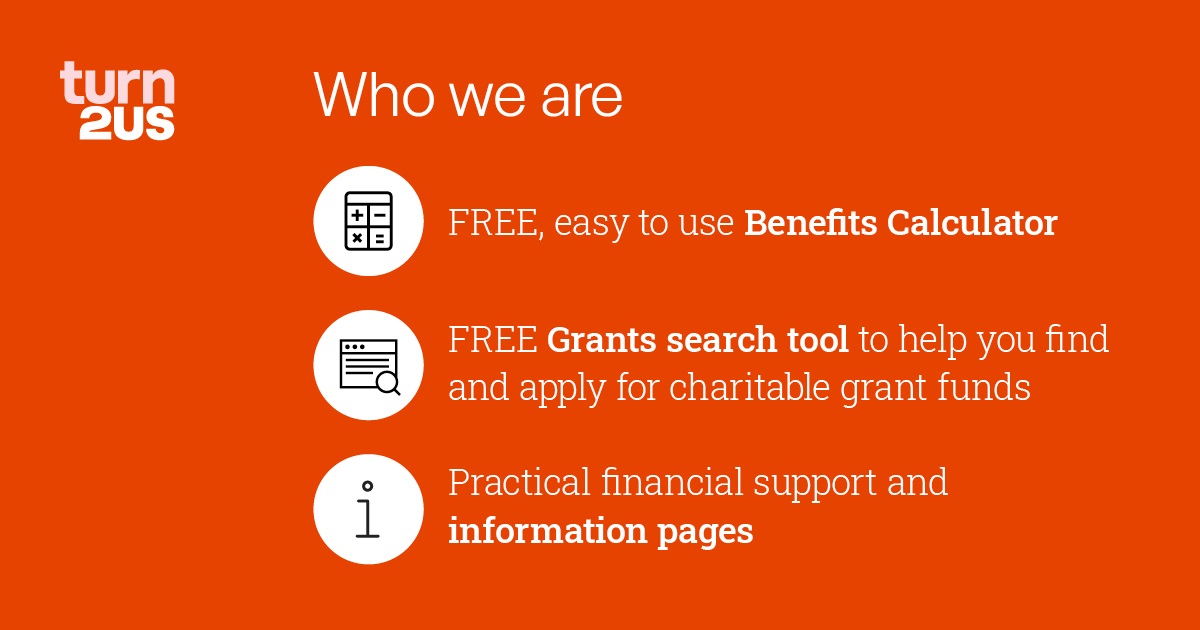This Fact Sheet is not relevant in your region
Sorry, this Fact Sheet is not relevant in your region. Please go to the Fact Sheet library to see Fact Sheets relevant in your region.
Help from charitable organisations (Scotland)
This fact sheet covers Scotland. We also have a version for England & Wales if you need it.
Use this fact sheet to:
see what kinds of help you might get from a charitable organisation;
get tips on applying for their help; and
understand how to find them.
Who can get help
Many of us, at one time or another will need a bit of extra help to deal with what life brings. Fortunately, there are many charitable organisations which understand this and which want to help. You might need a little extra help to deal with:
the expense of a new child or an unexpected debt;
an illness or a disability which stops you working; or
setting up a new home with few resources.
Whatever your need is, a charity might be able to help you to deal with your situation more easily.
Help that charities can offer
Charities offer a range of different kinds of help, depending on their purpose and resources. They might offer:
money - for example, to pay for an essential item or to clear an energy debt;
a product - for example, a voucher for goods, items needed by people with particular conditions; or
a service - for example, a holiday for a disabled person or a carer.
Where to find charitable help
Turn2us
Use the online Grants Search on the Turn2us website www.turn2us.org.uk to help you find charitable help based on your situation.
Have a look at the information on the Grants - what you need to know page first, so that your application has the best chance of success.
Tips on applying for a grant
Each charitable fund will have its own application process that usually includes filling in forms and communicating with people. This could include going online, speaking to someone on the phone and writing letters.
Make sure you meet the application rules before you apply.
Most funds will ask for evidence, including recent financial statements and something to show that you qualify for the charity's help.
Read any guidance notes before applying.
Some charities will only accept applications through an intermediary or support worker who applies on your behalf. Intermediaries that might help include:
health and social care professionals, such as nurses, doctors, therapists and social workers;
advisers from Citizens Advice Scotland and other advice organisations;
staff and volunteers from charities working with people in financial need;
someone who speaks on your behalf, for example, an advocate for people with mental health issues or learning disabilities; and
teachers.
Benevolent funds
Many occupations and some organisations have dedicated benevolent funds. These might help you with a grant or other kind of assistance if you, or a member of your family, has:
worked in a particular occupation or industry;
been a member of a union or an association; or
worked for a large firm or an organisation, such as the Civil Service.
Use this kind of detail in your grant searches. If you know of an organisation that could help you, they will usually have a website giving their contact details.
The Scottish Welfare Fund
The Scottish Welfare Fund helps families and people in Scotland who are on low incomes through Crisis Grants and Community Care Grants.
You can apply for a:
- Crisis Grant – if you're in crisis because of a disaster (like a fire or flood), or an emergency (like losing your money or an unexpected expense); and
- Community Care Grant – to help you or someone you care for to start to live, or to carry on living, a settled life in the community.
For more information go to the go to the website www.mygov.scot www.mygov.scot and search for ‘Scottish Welfare Fund’.
Local organisations
Local agencies, such as Citizens Advice Scotland, usually know what kinds of help are available locally and how to apply for it. Find your nearest office on their website www.citizensadvice.org.uk/scotland/.
The Financial Health Check service also gives advice on applying for benefits and reducing your household costs. You can call for advice on 0800 085 7145 or visit your local Citizens Advice and ask for this service.
Your local council will be able to tell you if they have a welfare assistance scheme that might help you. Use the mygov.scot website www.mygov.scot/find-your-local-council/ to get their contact details.
Advicelocal’s website www.advicelocal.uk has a postcode lookup tool to help you find local agencies in your area.
Help with Energy and Water Bills
If you are struggling to pay your energy or water bills, help may be available from energy company schemes, benefits, charitable grants or your local council
See the Turn2us Help with Energy and Water Bills information - https://www.turn2us.org.uk/Your-Situation/Energy-and-Water-Bills
Foodbanks
The Trussell Trust has set up foodbanks where you might get emergency food, if you can’t afford to buy what you need. See if there is a foodbank in your area on their website www.trusselltrust.org. Use the Find a foodbank near you search box. Other foodbanks have been set up, linked to the Independent Food Aid Network. You can get contact details for these foodbanks on their website www.foodaidnetwork.org.uk. Click on the members list and map on the home page. People at foodbanks may be able to suggest other kinds of help too.
Internet
The Money Saving Expert website www.moneysavingexpert.com is a good source of information about different types of grants that are available and other ways to save money. Search using the words ‘Grant grabbing’ to get more information.
Ways to clear your debt
There are different ways to deal with your debts.
Whatever your situation, there is usually an option that is suitable for you.
See our Ways to clear your debt fact sheet for more information.
